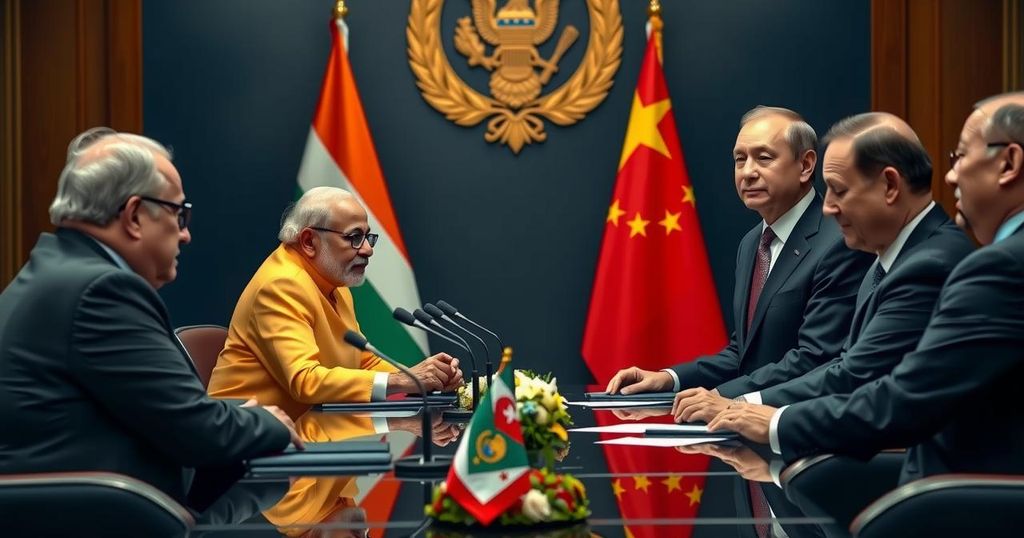During a BRICS summit in Kazan, Indian Prime Minister Narendra Modi called for a peaceful resolution to the Ukraine conflict, while Chinese leader Xi Jinping praised the strong ties between China and Russia. South African President Cyril Ramaphosa reflected on the historical support provided by Russia to South Africa. The summit aims to demonstrate Russia’s ongoing global partnerships despite Western sanctions and illustrate a multipolar world.
At the BRICS summit held in Kazan, Russia, Indian Prime Minister Narendra Modi urged for a swift resolution to the Ukraine conflict during a meeting with President Vladimir Putin. Modi emphasized the importance of peaceful resolutions, stating, “We believe that disputes should only be resolved peacefully. We totally support efforts to quickly restore peace and stability.” Meanwhile, Chinese leader Xi Jinping lauded the deep ties between China and Russia, referring to them as a source of strength amid a chaotic global environment. The summit, which involves approximately 20 world leaders, seeks to illustrate Russia’s continued global partnerships despite the Western sanctions following its invasion of Ukraine. South African President Cyril Ramaphosa also affirmed his country’s supportive stance towards Russia, deeming it a valued ally dating back to anti-apartheid efforts. The gathering symbolizes a significant international engagement for Russia as it faces geopolitical isolation, with discussions covering a potential BRICS-led payment system to challenge the SWIFT network. Additionally, the meeting highlights Russia’s ongoing military cooperation and evolving alliances with nations such as China and Iran. The Kremlin aims to project an image of a multipolar world, distancing itself from Western hegemony, even as the United States expresses skepticism about BRICS’ potential as a geopolitical rival. Reports indicate heightened security measures in Kazan, reflecting concerns about the surrounding areas’ safety. Furthermore, the ambitious group of nations, initially starting as BRIC in 2009, has expanded to include South Africa, Egypt, and Iran, although this expansion brings its own set of internal tensions, notably between India and China.
The BRICS summit convenes leaders from emerging economies, namely Brazil, Russia, India, China, and South Africa, with a mission to foster collaboration and counter Western influence. Established in 2009, the group has evolved, expanding to include nations like Egypt and Iran. This particular summit comes amid heightened tensions due to the ongoing Ukraine conflict, which has significantly affected global geopolitics. Modi’s outreach to both Moscow and Kyiv illustrates India’s desire to maintain a diplomatic balancing act, seeking peace while preserving longstanding ties with Russia. Similarly, other leaders, such as Xi Jinping and Cyril Ramaphosa, express solidarity with Moscow, indicating a unified front among certain countries against Western pressures and sanctions.
The BRICS summit in Kazan serves as a platform for leaders from emerging economies to reinforce their alliances, particularly through the shared support for Russia amidst the ongoing Ukraine conflict. Prime Minister Modi’s call for peace, Xi Jinping’s commendation of Russia, and President Ramaphosa’s acknowledgment of historical ties accentuate a collective stance geared toward countering Western isolation efforts. This meeting exemplifies the nuanced dynamics of international relations as the world transitions towards a multipolar structure, despite underlying divisions within the bloc.
Original Source: www.courthousenews.com







